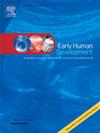Association of eating behaviors and parental feeding attitudes with weight-for-height Z score in children aged 0–2 years
IF 2.2
3区 医学
Q2 OBSTETRICS & GYNECOLOGY
引用次数: 0
Abstract
The aim of this study was to develop a questionnaire suitable for the 0–2 years old children with feeding problems in pediatric outpatient clinics and to investigate the association of eating behaviors and parental feeding attitudes with weight-for-height Z score (WHZ). We developed the questionnaire of Children's eating behaviors and Parental feeding attitudes (CEB-PFA), including 7 subscales with Eating behaviors, Picky eating, Food texture, Parental psychology, Feeding behaviors, Feeding knowledge, and Family factors, which was completed by parents of children aged 0–2 years in pediatric clinics. We conducted a reliability analysis of the CEB-PFA and examined gender and age differences in eating behaviors and parental feeding attitudes. Regression models assessed the association of eating behaviors, parental feeding attitudes, and weight-for-height Z scores of children aged 0–2 years, by controlling for month of age, sex, height-for-age Z scores (HAZ), small for gestational age infant (SGA), premature, Cow's milk protein allergy (CMPA), the child's Primary feeder, and the questionnaire filler. The subscales demonstrated satisfactory internal reliability (Cronbach's alpha ranging from 0.539 to 0.808). Significant age differences were observed in the Parental Feeding Behaviors subscale, and a correlation was found between WHZ and both parental psychology and feeding behaviors. This study confirmed that parental psychology and feeding behaviors were significantly associated with weight-for-height Z scores in infants and young children and provide child healthcare professionals with a potential tool to identify the primary causes of feeding difficulties in infants and young children.
0 ~ 2岁儿童饮食行为和父母喂养态度与身高体重比值Z评分的关系
本研究的目的是编制一份适用于儿科门诊0-2岁有喂养问题儿童的问卷,探讨饮食行为和父母喂养态度与身高体重Z分(WHZ)的关系。本研究编制了《儿童饮食行为与父母喂养态度问卷》(CEB-PFA),包括饮食行为、挑食、食物质地、父母心理、喂养行为、喂养知识和家庭因素7个分量表,由0-2岁儿科门诊儿童的父母填写。我们对CEB-PFA进行了可靠性分析,并检查了性别和年龄在饮食行为和父母喂养态度方面的差异。回归模型通过控制月龄、性别、年龄身高Z分数(HAZ)、小于胎龄婴儿(SGA)、早产、牛奶蛋白过敏(CMPA)、儿童主要喂养者和问卷填写者,评估0-2岁儿童的饮食行为、父母喂养态度和体重身高Z分数之间的关系。子量表具有令人满意的内部信度(Cronbach's alpha范围为0.539 ~ 0.808)。父母摄食行为量表存在显著的年龄差异,WHZ与父母心理和摄食行为均存在相关性。本研究证实,父母心理和喂养行为与婴幼儿体重身高Z分数显著相关,并为儿童保健专业人员提供了一种潜在的工具,以确定婴幼儿喂养困难的主要原因。
本文章由计算机程序翻译,如有差异,请以英文原文为准。
求助全文
约1分钟内获得全文
求助全文
来源期刊

Early human development
医学-妇产科学
CiteScore
4.40
自引率
4.00%
发文量
100
审稿时长
46 days
期刊介绍:
Established as an authoritative, highly cited voice on early human development, Early Human Development provides a unique opportunity for researchers and clinicians to bridge the communication gap between disciplines. Creating a forum for the productive exchange of ideas concerning early human growth and development, the journal publishes original research and clinical papers with particular emphasis on the continuum between fetal life and the perinatal period; aspects of postnatal growth influenced by early events; and the safeguarding of the quality of human survival.
The first comprehensive and interdisciplinary journal in this area of growing importance, Early Human Development offers pertinent contributions to the following subject areas:
Fetology; perinatology; pediatrics; growth and development; obstetrics; reproduction and fertility; epidemiology; behavioural sciences; nutrition and metabolism; teratology; neurology; brain biology; developmental psychology and screening.
 求助内容:
求助内容: 应助结果提醒方式:
应助结果提醒方式:


